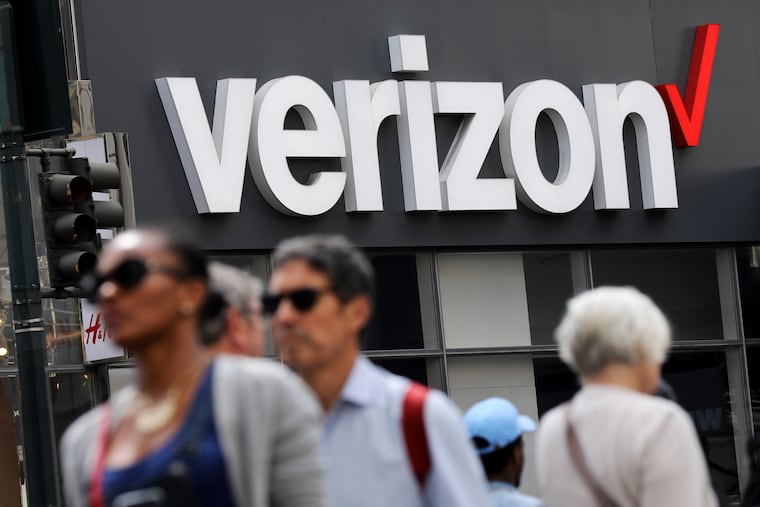Verizon ditches hidden fees, cable bundles to lure cord cutters. Will Comcast, others follow?
Verizon rolled out the pricing plans during a disruptive time in the TV industry, with cable companies losing hundreds of thousands of video customers per quarter to online streaming services.

Verizon Communications is getting rid of hidden fees and cable bundles that lock customers into long-term contracts, hoping to win over consumers ditching pay-TV for cheaper online streaming.
The company said Thursday that it is letting Fios customers choose internet speeds and TV packages separately, without signing annual contracts that often leave customers paying more after a year or two. Verizon will also offer customers personalized TV packages based on their favorite channels.
Verizon is rolling out the new pricing plans during a disruptive time in the TV industry, with cable companies losing hundreds of thousands of video customers every quarter to online streaming services. The company’s plan addresses some common complaints with cable, such as “hidden fees” that jack up monthly bills. Although Verizon claimed its new strategy would disrupt the cable industry, the company is still a small player in the pay-TV market, and it could be taking steps to abandon the cable TV business altogether, industry analysts said.
Under the new model, called Mix & Match, Verizon will sell three tiers of internet speeds, ranging from $40 to $80 a month, and charge $15 per month to rent routers. Customers will then choose one of several TV packages, from $50 to $90 a month, plus $12 per set-top box. The cheapest TV plan will offer consumers roughly 125 channels based on their five favorites. The company also offers a YouTube TV streaming subscription with about 70 channels for $50 a month.
Fees for broadcast television and regional sports networks will be baked into advertised rates, instead of being itemized on monthly bills. Such fees have skyrocketed in recent years and gotten the attention of consumer groups and lawmakers, who’ve said the “hidden fees” should be included in promotional prices.
“Customers are tired of having to buy a bundle with services they don’t want to get the best rates, and then discover that those rates didn’t include extra fees and surcharges,” Frank Boulben, Verizon’s senior vice president of consumer products and marketing, said in a statement.
Verizon’s strategy is targeting a growing share of consumers who want to save money and have more control over what they pay for, creating a market for online streaming competitors such as Netflix and Amazon, said Jeff Kagan, an independent telecommunications industry analyst.
“The customer is getting disillusioned with rising cable TV prices, and they’re just looking for options,” Kagan said. “What Verizon is offering is a good idea. Verizon is not a heavy hitter when it comes to pay-TV, so I don’t know if it will impact the pay-TV industry. If it does, then it could enable more companies to offer this a la carte pricing and let the customer choose what they want to buy.”
Verizon is a small player in the pay-TV space, with nearly 4.3 million video customers as of the third quarter last year. By comparison, Philadelphia-based Comcast Corp., the nation’s largest cable TV provider, has 21.4 million. Comcast declined to comment on Verizon’s announcement.
Verizon has reported net losses of video customers each quarter since 2017, according to data from MoffettNathanson, a New York market research firm. The company has lost 171,000 video customers through the first nine months of 2019.
The company has never made money in video and the new pricing plan could be the first step in eventually leaving the TV business, according to industry analyst Craig Moffett of the MoffettNathanson firm.
“By abandoning promotions, they are effectively stepping back from competing for video subscribers,” he said. “The bottom line is that their new pricing of broadband is competitive. Their pricing of video is not. This is their way of at least beginning to get out.”
An October study of roughly 800 cable bills by Consumer Reports, a consumer advocacy group, found that company-imposed fees cost customers $37 a month on average, or nearly $450 a year — effectively adding a 24% surcharge on top of the advertised base price. The report estimated that cable companies could be collecting $28 billion a year from such hidden fees.
On Thursday, the group praised Verizon’s plan to get rid of fees.
“Finally, a major cable company has gotten the message,” Jonathan Schwantes, senior policy counsel for Consumer Reports, said in a statement. “Consumers are fed up with paying hundreds of dollars in extra fees each year that weren’t always clearly disclosed when they signed up for service.”